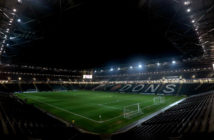
Design by Brent Diskin
FOLLOWING ENGLAND HAS BEEN HYPE OVER HOPE
It’s taken the best part of 40 years, but the penny appears to have finally dropped with English soccer and their place in the world.
Irrespective of the occasion, or the opposition, you could place your last dime on the English media whipping up a delusional storm.
In turn, the misguided supporters would back England at the bookmakers. England’s odds would fall, and the outcome would be ‘The Three Lions’ would be among the favorites for whatever cup they had no hope of winning. This was then leapt on by the media, who simply perpetuated the myth that England had a sniff of a chance. A never-ending circle of hope, built on hype.
Sadly, the truth of the matter is that England – save for near-misses in 1990 (Italy World Cup) and 1996 (England Euros) – are no nearer winning a major trophy in 2013 than they were at any time since the home victory on that July day in 1966, when they beat West Germany in the World Cup final.
That’s not to say we’ve been without our fair-share of great players – Bobby Moore, Sir Bobby Charlton, Gordon Banks, Kevin Keegan, Gary Lineker, Paul Gascoigne, Wayne Rooney, Michael Owen, Frank Lampard, Steven Gerrard and others, but nowhere near the length of a list many would have you think for the nation which bore the beautiful game.
Athletic, aggressive and intense, but lacking in technical ability.
That’s the description of England’s style of play down the years, and it’s not without foundation. Technically gifted players have been a little thin on the ground. Gascoigne, Glenn Hoddle and Matthew Le Tissier were among the best of their generation, but were the exception rather than the norm.
It says much for the lack of success that the triumphant team from ’66 would be wheeled out every two years to ponder the chances of the current England hopefuls. I recall, in 1998, working for BBC local radio where one of our clubs was managed by the late Alan Ball. A World Cup winner with England, it was expected that he would give numerous interviews ahead of the World Cup in France, which he duly delivered.
Now, don’t get me wrong. I’m a patriotic Englishman who is prone to the occasional throwing of cushions, frustrated at what I perceive to be a below-par performance from my national side. There’s nothing I’d love better than to see England lift the World Cup in 2014, but it’s not going to happen. And I doubt it will happen in my lifetime.
Why, you may ask, for England has one of the strongest domestic leagues in the world, envied by many for the drama, quality and excitement?
In my most humble of opinions, it is the very success and strength of the Barclays Premier League which is further undermining the future growth of the England national team. How often do we read of teams fielding sides devoid of any English players? Look at where the Premier League is awash with foreign talent, and it’s likely that is where the England team is struggling in terms of depth.
At the 2006 World Cup in Germany, I recall sitting in Cologne’s RheinEnergie Stadion, awaiting the then-England manager Sven-Goran Eriksson for his press conference ahead of their group game with Sweden. The room was heaving with English media. Indeed, there were numerous colleagues from the BBC, all adding to the media circus which traipsed around after England.
This was my first taste of an England World Cup press conference, and I was staggered at the sheer number of journalists, pens poised, wistfully wondering whether ‘this year would be England’s year.’
“How many media follow England?” I asked a fellow-BBC reporter.
He shot back: “About 350.”
My face must have given away what I was thinking, as he added: “Yes, but the Brazilians have more than 400 following them.”
It was at this point that I rattled off a number of suggestions as to why his reasoning was full of holes:
- Brazil has a far greater population than England (in 2006, 187 million against 51 million).
- In 2006, the South American nation was top of the FIFA world rankings, and defending champions.
- Victory in Japan/South Korea four years earlier was their fifth World Cup win, and made them the most successful nation in the tournament’s history.
In other words, the belief that Brazil would return home from Germany with the trophy was built on real success. If they went into a competition bulging with confidence, then it was well-placed as a result of decades of consistency in the game’s top tournament.
In contrast, England – and by this I mostly mean media and supporters – were still on the blinkered, bordering on arrogant understanding that, as inventors of the game, success was deserved and long overdue.
The England team which went to the 2012 European Championships, did so with less expectation than I can ever recall. There, finally, appears to be recognition that the world has ‘taken our game’, learnt it, tweaked it and vastly improved on what we can muster.
The English speak an international language and – as a nation – are quite lazy when it comes to learning others. The same could be said for soccer. There was a sense that ‘we brought it to the world, so what can others teach us? Why do we need look beyond our borders?’
The end product was that very few English players ventured abroad to enhance their soccer education, believing that the mother of the game had all the answers.
Thankfully, times have changed, but I fear the long-term damage may already have been done. The influx of foreign coaches taught us we had much to learn. The English game now has better training methods and better nutrition. And those foreign coaches were swift to spot a gap in the talent pool, and therefore brought in technically-better foreign players.
The world is a smaller place, and so too is the sport of soccer. And that means a big problem for England, and their hopes for 2014 and beyond.
![Prost International [PINT]](https://prostinternational.com/wp-content/uploads/2021/08/PINTtFontLogoRoboto1536x78.jpg)


